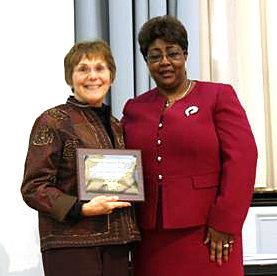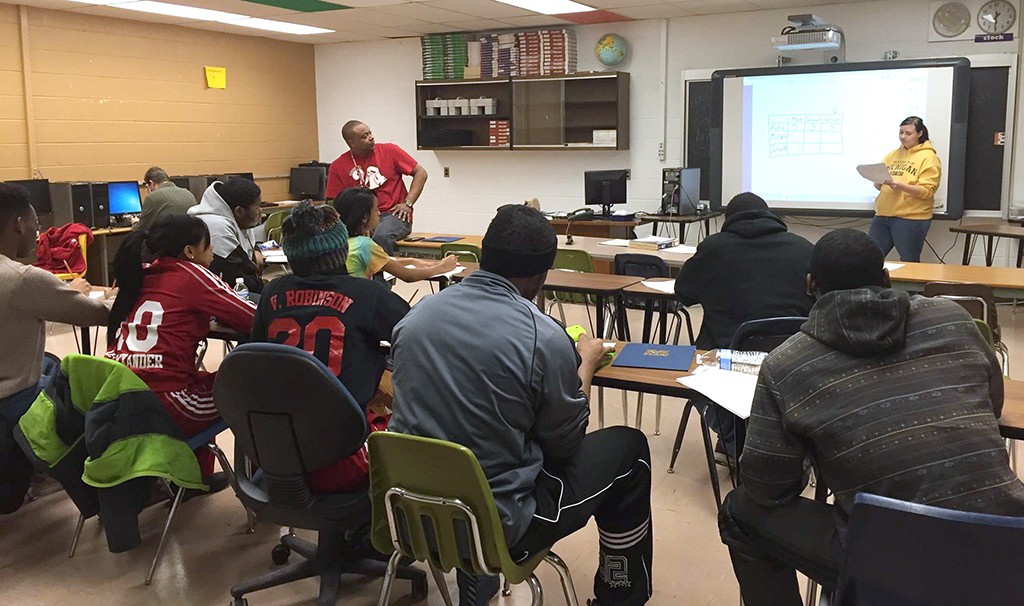By Mona Munroe-Younis

We are excited to recognize the local nonprofit Motherly Intercession, and share how the UM-Flint community is and can work with this organization to create bright new futures for children with incarcerated parents. The organization’s vision is that the children will realize that their parent’s destiny does not have to be their own and chart successful career paths for themselves.
A Passionate Grassroots Beginning
Shirley Cochran is the soft spoken and eloquent Founder and Executive Director of Motherly Intercession. Under her leadership, Motherly Intercession is hard at work to break the cycle of intergenerational incarceration. Mrs. Cochran essentially started the organization 15 years ago at Christmas time when she and her spouse wanted to support a family that could not be together during the holidays because the mother was incarcerated. She reached out to mothers who were held in the Genesee County Jail, and received 23 responses. As she went through the families’ applications, trying to determine who most needed her help, Mrs. Cochran could not pick one family over another. “In an effort to support all of the families, I solicited the assistance of five other community members, which quickly grew to 15 volunteers,” explained Cochran.
What started as a hope to brighten the holiday of one family, soon grew into a volunteer-based network of support for children with incarcerated parents. This was the start of something bigger than any of the volunteers imagined, and they developed Motherly Intercession into a non-profit organization in 2001. After the holiday project, the group surveyed incarcerated mothers, and spoke with their children and alternate caregivers to understand their greatest unmet needs. They found that the most profound challenges the children faced were:
- Family separation – children had not seen their mother since her incarceration
- Emotional trauma – separation anxiety with the sudden loss of a parent
- Truancy – not attending school, dropping out or failing school
- Detrimental behavior – shoplifting, rebellious attitudes or entering the juvenile system
The volunteers quickly realized that the families’ needs far exceeded the capacity of the community to respond, because no agencies in existence at the time were dedicated to this particular vulnerable population. Mrs. Cochran shared that they were “troubled by the magnitude of the problems the young, innocent children were facing, so the group changed its focus to the children of incarcerated parents.” Over time, the growing organization worked with the UM-Ann Arbor School of Public Health to develop evidence-based programs, helping to ensure that Motherly Intercession’s programming achieved desired results for the well-being of the children and their families.
Forging a Mutually-Reinforcing Relationship
On November 1, 2014, Motherly Intercession proudly awarded Dr. Suzanne Selig, Department Chair of the UM-Flint Department of Public Health & Health Sciences, an Essential Piece Award for her contributions to the organization over many years.

Dr. Suzanne Selig (left) accepts the Essential Piece Award bestowed by Motherly Intercession Executive Director Shirley Cochran at the organization’s annual fundraiser dinner.
Shirley and Suzanne met in 2009 when Motherly Intercession looked to UM-Flint for interns. The organization, by then an official 501(c)3 nonprofit, needed “interns to fill critical Group Leader positions for a two-year research project [with the UM Prevention Research Center] that focused on developing a system of support for the incarcerated families of Genesee County.” According to Mrs. Cochran, “Suzanne willingly agreed to collaborate with us and provided two excellent young women to fill those positions. The internship placements continued throughout the project from which our Strengthening Incarcerated Families program derived.”
In turn, Motherly Intercession’s internship placements gave UM-Flint public health students coveted real-world experiences within peer-reviewed research projects and leadership potential. For example, Shirley credits Suzanne with placing then-intern Michelle Fairley with Motherly Intercession, ultimately leading to Ms. Fairley becoming the President of Motherly Intercession’s Executive Board of Directors. Shirley also shared that Suzanne’s relationship with the organization ran deeper as she supported Motherly Intercession through her personal involvement “by attending our Annual Dinners, and the children’s Reading And Counting to Success (RACS) after school tutorial program graduation ceremonies.”
For her long-standing and diverse contributions, Motherly Intercession recognizes Dr. Selig as an “Essential Piece” champion for children with incarcerated parents.
Each Day, Unlocking Children’s Futures
Now, in the Winter 2015 semester, a group of UM-Flint students in professor Tony McGill’s capstone Senior Seminar in Professional Communications (COM 426) class is working with Motherly Intercession to raise awareness about the organization’s latest fundraising campaign.
The students in this service-learning class will put their social media, written, and face-to-face communication skills to work and gain resume-building, real-world experience by helping the organization reach its goal of raising $14,000 in 30 days through the online crowdfunding campaign “Let’s Unlock the Future.” The funds will be used to purchase an urgently needed van.
Recently, Motherly Intercession was troubled to find an essential piece of its tried-and-true service delivery model out of commission and in need of replacement. The vast majority of families that Motherly Intercession serves are in poverty and do not have access to transportation. For that reason, Motherly Intercession requires its 15-passenger van to ensure that children from all over Genesee County consistently access the organization’s academic and other support services, as well as wrap-around services of complementary agencies (i.e. mental health assessments, arts enrichment, etc.).
In fall of 2014, the van was a victim of a hit-and-run accident. Then, on Devil’s Night, a mischief-maker smashed the windows of the van and other vehicles down the block (a first experience for Motherly Intercession). These damages, plus the fact that the van was already worn down and needing increasingly costly repairs, rendered the van in need of replacement.
Stay tuned for more news about this partnership as the semester progresses!
Get Involved
Are you inspired by Motherly Intercession’s mission and interested in supporting its work? Consider these ways of getting connected and making a difference:
- Join the COM 426 students in spreading the word about the Indiegogo campaign through your networks. Send emails, call your friends, and share the campaign through social media.
- Volunteer to provide academic tutoring for the Reading and Counting to Success after-school program.
- Call the organization at (810) 424-9909 to explore other ways to get involved through service-learning, research, or other forms of volunteer service.
Check out this video to see Motherly Intercession in action and learn more about the transformation it brings to the Greater Flint community!
[youtube]http://www.youtube.com/watch?v=6TQkc2h5rtg[/youtube]


